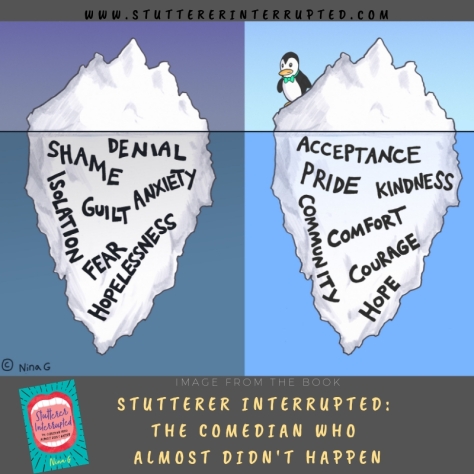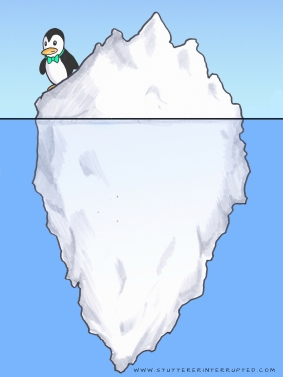It’s that time of year again! That’s right, October 22nd is International Stuttering Awareness Day! As a person who stutters, 10/22 represents something very near and dear to my heart. In my career as an author, comedian, and educator, spreading awareness is the common theme that drives all my work. But what does “awareness” really mean? Most people are “aware” of stuttering: they know what it is; they know that it exists. But beyond that? How stuttering affects our lives, how it affects the way we interact with other people—the really important stuff—those things rarely enter into the mainstream discussion. So, in honor of International Stuttering Awareness Day, I thought I’d make a quick list of things I think we should all be aware of. I encourage other people who stutter to add to this list in the comments, sharing some of your experiences. I certainly don’t speak for all of us!
1. Beware Completing People’s Sentences
The name of my new book (shameless plug) is Stutterer Interrupted. Why did I pick that title? Yeah, it’s a reference to the Wynona Ryder thing, but, more importantly, it’s a reference to the fact that we are always being interrupted! It typically goes something like this:
ME:
“I would like p-p-p–”
OTHER PERSON:
“Pumpernickel? Pizza? Pasta?”
Like the picture says, “I stutter! You’re gonna have to wait for all my brilliant ideas.” Having someone guess my next word makes things uncomfortable, which makes it harder for me to communicate. Plus, their guesses are almost always wrong! Things will go smoother if the listener just waits for the person stuttering to complete their thought. We love attentive listeners!
2. Beware Unwanted Advice (on Stuttering)
Unless I’m asking for it—or better yet, paying for it—I don’t want any tips on how to “improve” my speech. I’ve gotten unsolicited recommendations for “miracle cures” that range from homeopathic remedies to sexual acts to divine interventions. And let’s not forget that timeless classic, “just slow down and breathe.” Usually, the advice-giver’s credentials consist of “my third cousin once-removed stutters… or wait, was it Tourette’s?” Occasionally, they turn out to be an actual medical practitioner or speech therapist, but that doesn’t make it any less inappropriate. There is a time and place. And that time and place is probably not at a wedding where the person who stutters is supposed to be having fun!
3. We Don’t Need to Be Fixed
That’s right! It is up to every individual to decide how they want to speak. Some people may choose to engage in therapy to manage their stuttering. Others may not. It’s a personal choice. I personally don’t feel the need to be fluent (i.e., able to speak without stuttering). My speech patterns are a part of who I am, resulting from a difference in my brain (or neurodiversity, as many of us call it). There are many types of people, which means many types of communicating. A person who stutters can communicate with the same clarity and effectiveness as anyone else. We just happen to have a less common way of doing it. Which brings me to my next point…
4. We Are Part of the One Percent (Not That One, the Other One)!
People who stutter make up only 1% of the adult population. Incredibly, only one fourth of that one percent are women! That’s why I refer to myself and my stuttering sisters as unicorns… because we are rare and elusive things of beauty! There are downsides to being a mythical creature though. Since we account for such a small part of the population, we don’t get a lot of representation in mainstream culture. You have to scour the ends of the Earth just to find a good stuttering role model on TV. If a person who stutters does appear in popular media, they are usually depicted in a gimmicky way that isn’t really empowering. That lady on Oprah who “cured” her stutter by wearing headphones for five minutes? Sorry, that doesn’t really do it for me. Growing up in the 1980s, the closest thing I had to a role model was a cartoon pig who didn’t wear pants. Yeah, I wish that was a joke. One of the best ways to spread awareness is through honest representation in the media… so let’s have more of that, eh?
5. There Is a Stamily Out There
Because people who stutter are few and far between, it’s an extra-special kind of awesome when we run into each other out there in the world. Sometimes it’s almost like finding long lost family, or “Stamily” as many of us call it. Growing up, I always felt like I was alone. I never knew there was such thing as a stuttering community. When I finally discovered that community, it changed the trajectory of my entire life. I was no longer alone. I suddenly had role models. I realized I could do anything, even be a stand-up comedian. I just wish someone had made me aware of it sooner… so you better believe I’m going to talk about it for Stuttering Awareness Day! There are so many amazing organizations around the world that support and bring together people who stutter: The National Stuttering Association (US), The British Stammering Association, The Indian Stammering Association, just to name a few. The International Stuttering Association even hosts an online conference in October, in honor of International Stuttering Awareness Day (check it out HERE). Many organizations also hold conferences and conventions that you can attend in person. I am not exaggerating when I say that I wouldn’t be the person I am today without these conferences. To be surrounded by nothing but Stamily for five days is simply mind-blowing—there’s no other way to describe it.
For a partial list of stuttering/stammering organizations all over the world, please find it HERE.
For T-shirts that say “I stutter! You are going to have to wait for all my brilliant ideas!” at: https://arkansas-tees.com/products/nina-g-stutterer-interrupted-brilliant-ideas-t-shirt
Thank you for reading this! And for celebrating International Stuttering Awareness Day! ❤


